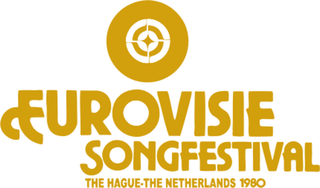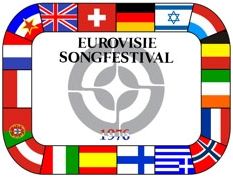
The Eurovision Song Contest 1980 was the 25th edition of the annual Eurovision Song Contest. It took place in The Hague, Netherlands, and was organised by host broadcaster Nederlandse Omroep Stichting (NOS) – which agreed to stage the event after Israel, having won in both 1978 and 1979, declined to host it for a second successive year – and the European Broadcasting Union (EBU). The contest was held at the Nederlands Congresgebouw on 19 April 1980 and was hosted by Dutch actress Marlous Fluitsma, although each song was introduced by a presenter from the participating nation.

The Eurovision Song Contest 1976 was the 21st edition of the annual Eurovision Song Contest. It took place in The Hague, Netherlands, following the country's victory at the 1975 contest with the song "Ding-a-dong" by Teach-In. Organised by the European Broadcasting Union (EBU) and host broadcaster Nederlandse Omroep Stichting (NOS), the contest was held at the Nederlands Congrescentrum on 3 April 1976 and was hosted by 1957 Dutch Eurovision winner Corry Brokken.
The Netherlands was represented by Maywood, with the song "Ik wil alles met je delen", at the 1990 Eurovision Song Contest, which took place in Zagreb on 5 May.
Belgium was represented by Reynaert, with the song "Laissez briller le soleil", at the 1988 Eurovision Song Contest, which took place in Dublin on 30 April. Reynaert was the winner of the Belgian national final for the contest, held in Brussels on 27 February.
Belgium was represented by Jean Vallée, with the song "L'amour ça fait chanter la vie", at the 1978 Eurovision Song Contest, which took place on 22 April in Paris.
Belgium was represented by Jacques Zegers, with the song "Avanti la vie", at the 1984 Eurovision Song Contest, which took place on 5 May in Luxembourg City. Zegers was the winner of the Belgian national final for the contest, held on 2 March.
The Netherlands was represented by Sandra Reemer, with the song "The Party's Over", at the 1976 Eurovision Song Contest, which took place on 3 April in The Hague, following Teach-In's victory for the Netherlands the previous year. The song was the winner of the Dutch national final for the contest, held on 18 February. This was the second of Reemer's three Eurovision appearances for the Netherlands: she had sung in the 1972 contest in a duo with Dries Holten (Andres), and would also take part in the 1979 contest under the name of Xandra.
Belgium was represented by synthpop band Telex, with the song "Euro-Vision", at the 1980 Eurovision Song Contest, which took place on 19 April in The Hague. Synthpop had never previously been tried in a Eurovision final, and the choice of song and group caused much comment, particularly regarding the implied sarcasm directed towards Eurovision in the song's deliberately banal lyrics.
The Netherlands was represented by the group Harmony, with the song "'t Is OK", at the 1978 Eurovision Song Contest, which took place in Paris on 22 April. Harmony were the winners of the Dutch national final for the contest, held on 22 February.
The Netherlands was represented by Xandra, with the song "Colorado", at the 1979 Eurovision Song Contest, which took place on 31 March in Jerusalem. The song was the winner of the Dutch national final for the contest, held on 7 February. Although it was claimed at the time that Xandra was the name of a six-piece band, in reality it was merely a name adopted by Eurovision veteran Sandra Reemer, who had previously represented the Netherlands in 1972 and 1976. The cover sleeves on the various domestic and international record issues of "Colorado" for example all pictured Reemer on her own without any "band members".
Germany was represented by Mary Roos, with the song "Aufrecht geh'n", at the 1984 Eurovision Song Contest, which took place on 5 May in Luxembourg City. "Aufrecht geh'n" was the winner of the German national final, held on 29 March. Roos had previously represented Germany in the 1972 contest in Edinburgh, where she had finished third.
Denmark was represented by Hot Eyes, with the song "Det' lige det", at the 1984 Eurovision Song Contest, which took place on 5 May in Luxembourg City. "Det' lige det" was chosen as the Danish entry at the Dansk Melodi Grand Prix on 18 February. This was the first of three Eurovision appearances in five years for the couple.
Luxembourg was represented by well-known German singer Jürgen Marcus, with the song "Chansons pour ceux qui s'aiment", at the 1976 Eurovision Song Contest, which took place on 3 April in The Hague. For the second time ever, broadcaster RTL organised a public national final rather than their usual method of internal selection. Marcus was the first German singer to represent Luxembourg, as their 1974 representative Ireen Sheer, although German-based, was British by birth.
France was represented by Catherine Ferry, with the song "Un, deux, trois", at the 1976 Eurovision Song Contest, which took place on 3 April in The Hague.
Norway was represented by Anne-Karine Strøm, with the song "Mata Hari", at the 1976 Eurovision Song Contest, which took place on 3 April in The Hague. "Mata Hari" was chosen as the Norwegian entry at the Melodi Grand Prix on 7 February. This was a third Eurovision appearance in four contests for Strøm.
France was represented by five-member group Profil, with the song "Hé, hé M'sieurs dames", at the 1980 Eurovision Song Contest, which took place on 19 April in The Hague.
Ireland was represented by Red Hurley, with the song "When", at the 1976 Eurovision Song Contest, which took place on 3 April in The Hague. "When" was chosen as the Irish entry at the national final on 8 February.
France was represented by Annick Thoumazeau, with the song "Autant d'amoureux que d'étoiles", at the 1984 Eurovision Song Contest, which took place on 5 May in Luxembourg City. The song was chosen through a national final organised by broadcaster Antenne 2.

